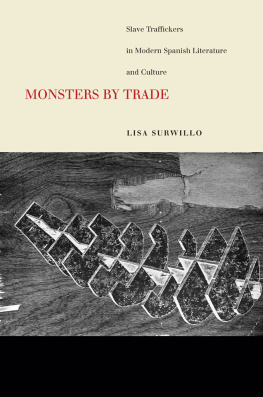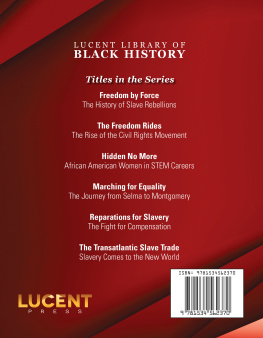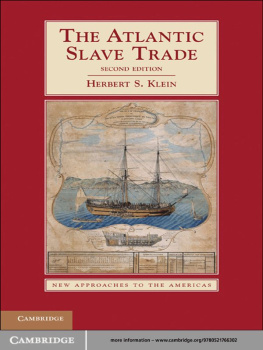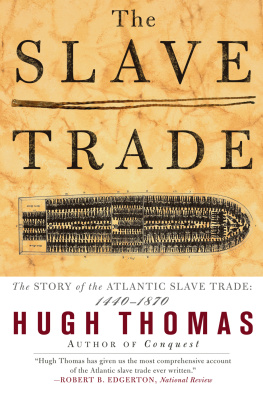Stanford University Press
Stanford, California
2014 by the Board of Trustees of the Leland Stanford Junior University.
All rights reserved.
No part of this book may be reproduced or transmitted in any form or by any means, electronic or mechanical, including photocopying and recording, or in any information storage or retrieval system without the prior written permission of Stanford University Press.
Printed in the United States of America on acid-free, archival-quality paper.
Library of Congress Cataloging-in-Publication Data
Surwillo, Lisa, author.
Monsters by trade : slave traffickers in modern Spanish culture / Lisa Surwillo.
pages cm
Includes bibliographical references and index.
ISBN 978-0-8047-8879-3 (cloth : alk. paper)
1. Spanish literature--19th century--History and criticism. 2. Spanish literature--20th century--History and criticism. 3. Slave trade in literature. 4. Slavery in literature. 5. Slave trade--Spain--History--19th century. 6. Slavery--Cuba--History--19th century. 7. Spain--Colonies--America--History--19th century. 8. Collective memory--Spain--History--20th century. I. Title.
PQ6073.S53S87 2014
860.9'3552--dc23
2014007325
ISBN 978-0-8047-9183-0 (electronic)
Typeset by Bruce Lundquist in 10.9/13 Adobe Garamond
MONSTERS BY TRADE
Slave Traffickers in Modern Spanish Literature and Culture
Lisa Surwillo
Stanford University Press
Stanford, California
Acknowledgments
While writing this book, I benefited from interactions with a number of treasured colleagues who encouraged me to think harder about the project. Their insights enriched this work beyond what I could ever have attained in solitude, and they assisted me in countless ways, from answering specific questions to engaging in sometimes seemingly interminable conversations about the minutiae of the nineteenth century. Special thanks are due to Hester Blum, Mary Coffey, Dru Dougherty, Bradley Epps, Tania Gentic, Sepp Gumbrecht, Tamar Herzog, Ruth Hill, Michael Iarocci, John Lipski, Ruth MacKay, Susan Martin-Mrquez, Jenny Martinez, Michael Predmore, Ralph Rodriguez, Sherry Roush, Gabriella Safran, Carmen Sanjuan-Pastor, Priya Satia, Christopher Schmidt-Nowara, and Akiko Tsuchiya. I would also like to thank the participants of the Treating the Trata colloquium held at Stanford University who shared their new work and raised provocative questions about how we deal with the slave trade in Hispanic Studies. In addition, the arguments I propose in this book were strengthened immensely by the suggestions of an anonymous reader who reviewed the manuscript for Stanford University Press with real dedication and to whom I am sincerely grateful.
This book emerged from the archives, and my successful exploration of documents was carried out thanks to generous funding from a variety of sources. I gratefully note the support of the Gilder Lerman Institute; the Program for Cultural Cooperation between Spains Ministry of Education, Culture and Sports and United States Universities; the Africana Research Center at the Pennsylvania State University; the Institute for Arts and Humanities at the Pennsylvania State University; and a Hewlett Faculty Grant. I am forever indebted to the staff at The Bancroft Library, where this project first began, and to Adn Griego of the Stanford Libraries, who sets a new standard for academic librarians.
I would also like to acknowledge several undergraduate and graduate research assistants, including Ruth Alonso, Mark Bajus, and Kelvin Smith, and especially Nicole Barraza with whom I shared great debates on nineteenth-century literature. I also thank the Uni General de Treballadors de Catalunya for providing me with correspondence from their archive and Ivn Larra Plaza for sharing his work and his vision with me and for granting permission to include his art here.
This book has only become a material reality through the support of editors Norris Pope and Stacy Wagner at Stanford University Press. The interventions of Ann Gelder and Alice Avery made this book more readable than it otherwise would have been.
I also am grateful to the Stanford University Work Life Office where a dedicated staff efficiently implements the universitys progressive policies for untenured faculty with young children. Finally, this book never would have been written without the limitless patience and support of my husband and daughters.
A Note on Translation
Quotations from Spanish or Catalan maintain original spelling, punctuation, and grammar. Unless otherwise attributed in parenthetical citations, all translations were undertaken by Nicole Barraza and Lisa Surwillo.
Introduction
Blanco White and Monsters of Coloniality
Books on nineteenth-century Spanish literature and culture have often begun by reciting the familiar debates: whether Spain underwent a liberal revolution; if the nation witnessed the rise of an authentic bourgeoisie; and why (or if) Spains modernization remained uneven. This book will not rehash these debates. Rather, it seeks to shift their terms by analyzing roles played by literature, art, and, more recently, leisure in exploring anxieties or cultivating silences around the fact that the modern, liberal nation of Spain, as well as several of its constituent parts, were a product (economic, political, cultural) of the particular nature of its post-1824 empire. That is, how might we tell the story of Spanish literature if an awareness of coloniality rather than a search for modernity were the privileged terms of analysis? Twentieth-century criticism has theorized how metropolitan Europe, more generally, was shaped by its colonies (consider the work of Hall, Said, and Fanon). Yet this framework has only recently come to bear on Spain in a systematic way, in no small part due to Francos long dictatorship and the resulting contentious nature of the discourses over the Spanish nation(s) throughout the twentieth century.
Inspired by Walter Mignolos theorization of the linkage of modernity and coloniality, this book follows the premise that a study of the culture and literature of modern Spain requires reading coloniality as inherent in their creation. Mignolo proposes a reading of coloniality that considers it quite simply, the reverse and unavoidable side of modernityits darker side, like the part of the moon we do not see when we observe it from the earth (22). Moreover, Mignolo notes that while histories of any number of European metropolises elide mention of their colonies, a history of Algeria, for example, cannot avoid France (51). Studies of Cuba, following this logic, cannot (and do not) fail to refer to Spain; yet the reverse has not been equally true, especially in the realm of culture. The implications of this framework of occlusion are particularly grave for the nineteenth century, when Spains claims to modernity were tenuous, in spite of its thriving Caribbean empire. This book analyzes Spanish literary, architectural, and artistic works that addressed unease over the means by which Cuba remained profitable and Spanish culture and Spain continued on a path to modernization. I intend to contribute to a more rounded understanding of modern Spain by recovering a nineteenth-century understanding of these interlocking systems of coloniality and peninsular modernity with slavery as their key. Indeed, the case of nineteenth-century Spain is unique among Atlantic powers in that although the empire was fundamental to the rise of early modern Spain, the arrangement was reformulated and the slave trade proved most influential in shaping Spanish modernity after it was declared illegal. I therefore return to the debates and tensions over the price of modernity as they were articulated in literary works of the nineteenth and early twentieth centuries, when modernity/coloniality had not yet been fully decoupled into the categories of domestic and foreign.
Next page




